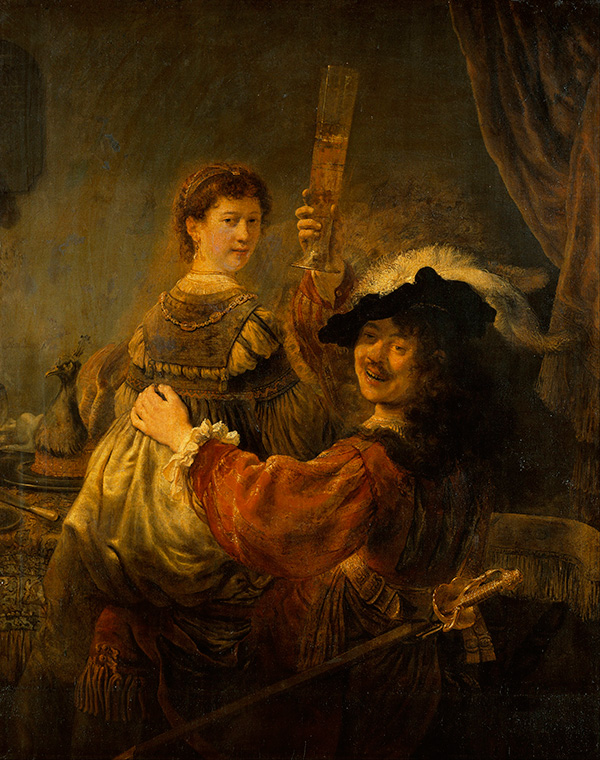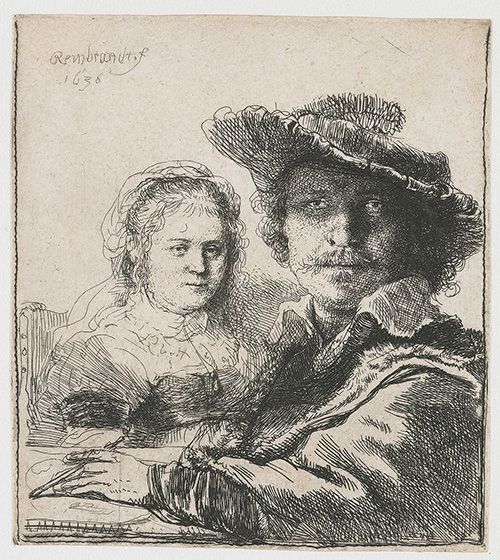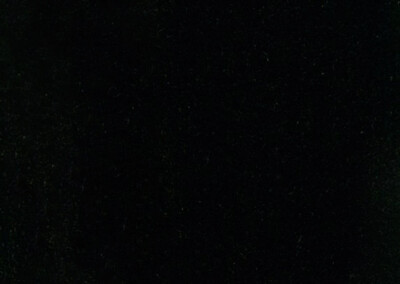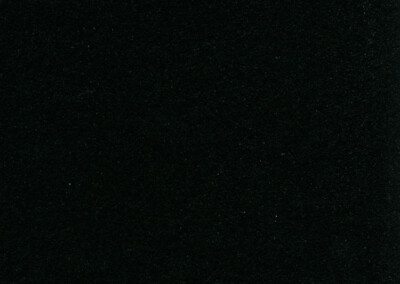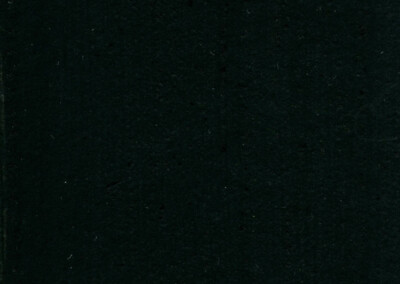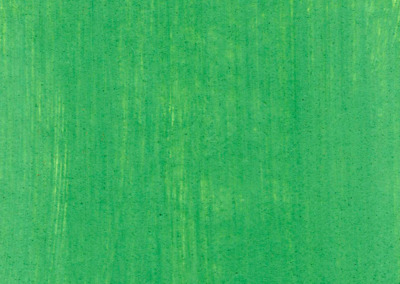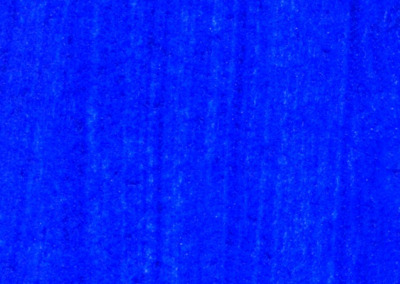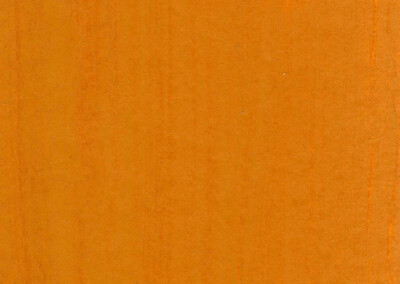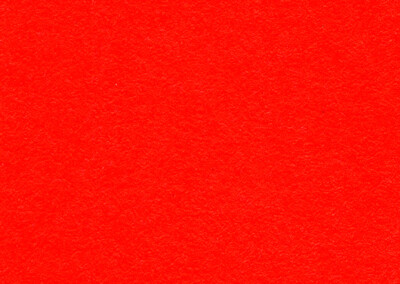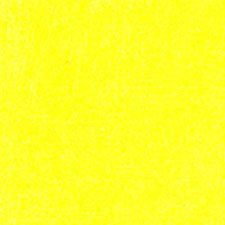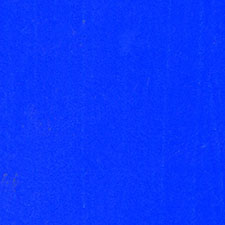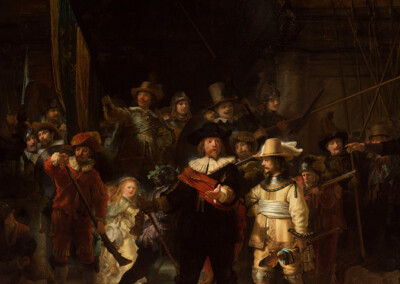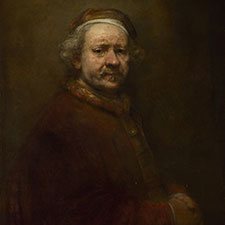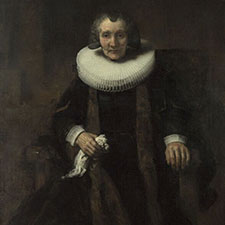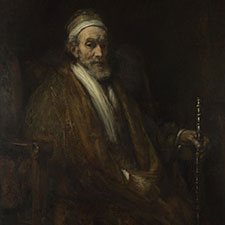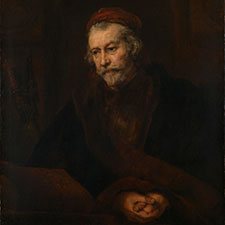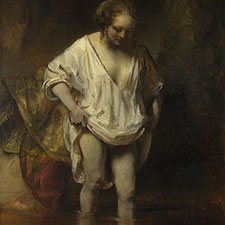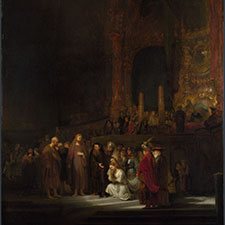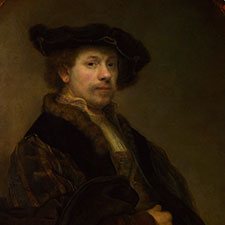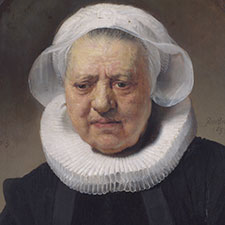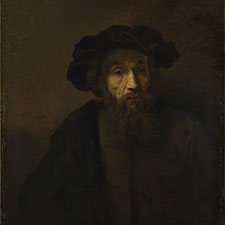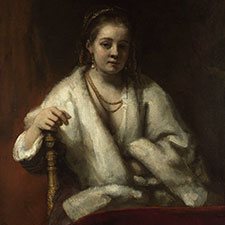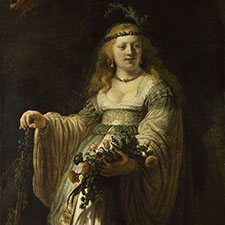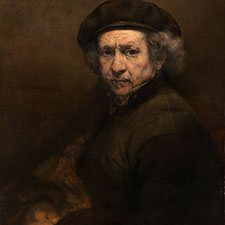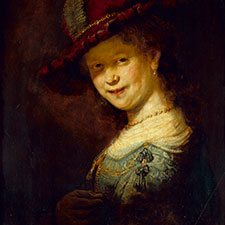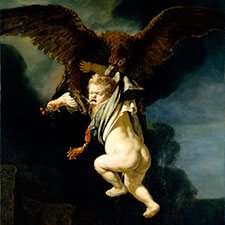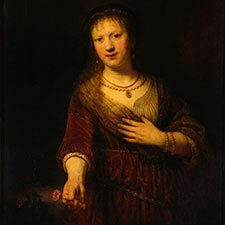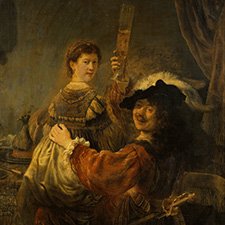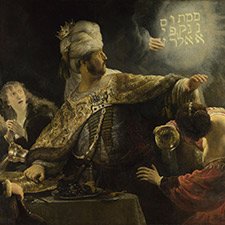Rembrandt, Self-Portrait With Saskia
ca 1635Rembrandt, Self-Portrait With Saskia
ca 1635Paintings sorted by Historical period | Painter | Subject matter | Pigments used
Overview
The painting is also known as ‘The Prodigal Son in the Brothel’
or ‘The Prodigal Son in the Tavern’
Medium: Oil
Support: Canvas
Size: 161 x 130.5 cm
Art period: Baroque
Staatliche Kunstsammlung Dresden (State Art Gallery Dresden)
Gallery Nr 1942.9.97
Painting in the Rembrandt Database
Characterization of this painting by the scientists of the Rembrandt Research Foundation (1):
“A poorly preserved painting that has undergone changes in format and whose composition has been altered. The areas belonging to the original composition must be regarded as authentic work by Rembrandt from c. 1635; the autograph nature of subsequent appreciable changes, probably made at the time of a reduction on the left, is much less certain. At some time a good deal later a strip of canvas was added along the bottom edge, once again altering the dimensions.”
References
(1) Bruyn, J. et al., The prodigal son in the tavern, in A Corpus of Rembrandt Paintings, Stichting Foundation Rembrandt Research Project, Volume 3, Springer 1989, pp 134-147.
Pigments
Pigment Analysis
This pigment analysis is based on the work of Herrmann Kühn at the Doerner Institute (1). Reports on technical examination of this painting including infrared and X-ray images can be found on the website of the Rembrandt Database.
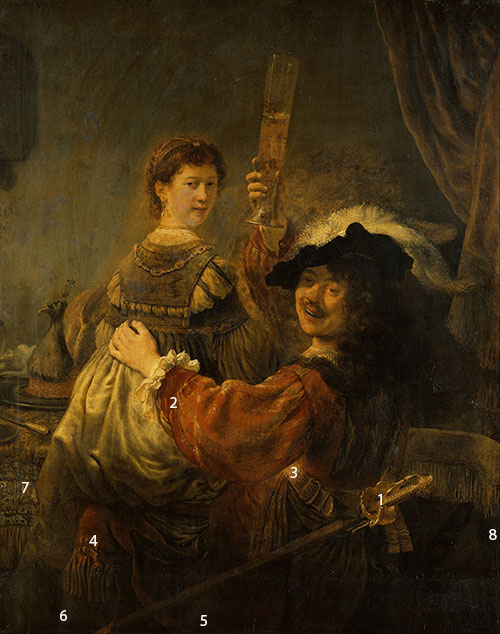
1 White on the sword handle: lead white.
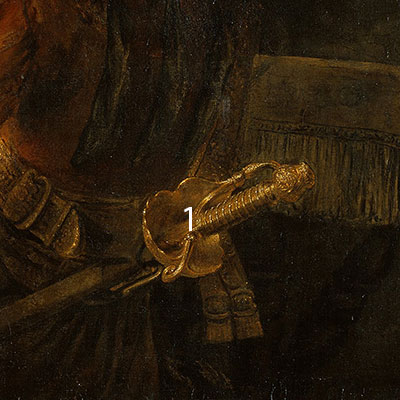
2 Red sleeve of Rembrandt: madder lake, red ochre with small amounts of lead-tin-yellow.
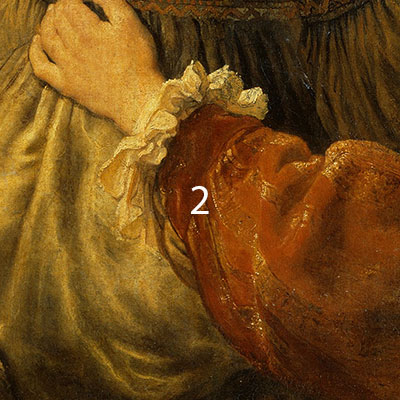
3 Bright yellow sword halter: lead white, lead-tin-yellow, yellow lake.
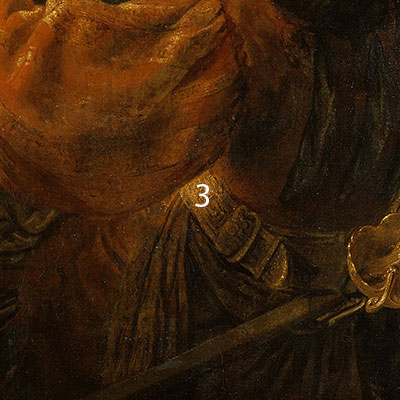
4 Yellow tassels on the knee of Rembrandt: lead white, yellow ochre, red ochre, yellow lake.
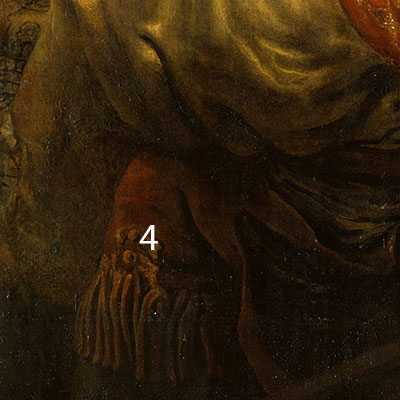
5 Brown addition on the right in the lower part of the painting contains several layers:
1. Red-yellow ground: yellow ochre and red ochre
2. Red ground: red ochre
3. Grey ground or underpainting: charcoal black with small amounts of lead white
4. Brown-black layer: bone black, brown lake
5. Brown layer: bone black, red ochre and red lake
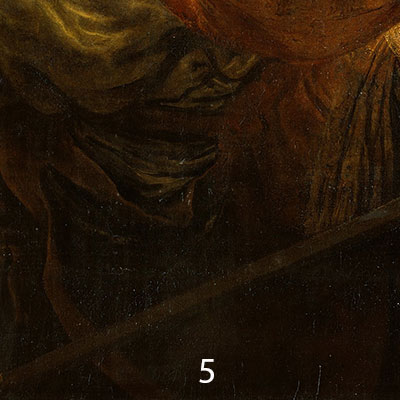
6 Brown addition on the left in the lower part of the painting contains several layers:
1. Red-yellow ground: yellow ochre and red ochre
2. Red ground: red ochre
3. Grey ground or underpainting: charcoal black with small amounts of lead white
4. Brown-black layer: bone black, brown lake
5. Brown layer: bone black, yellow and red ochre and green earth
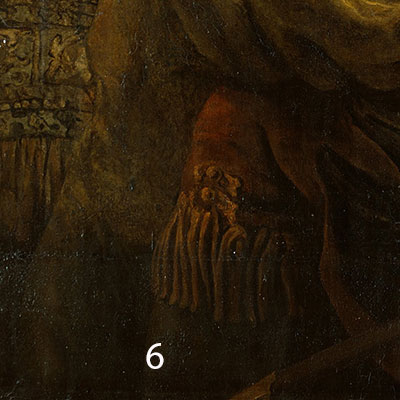
7 Brown-black pattern in the table covering: Vandyke brown, charcoal black.
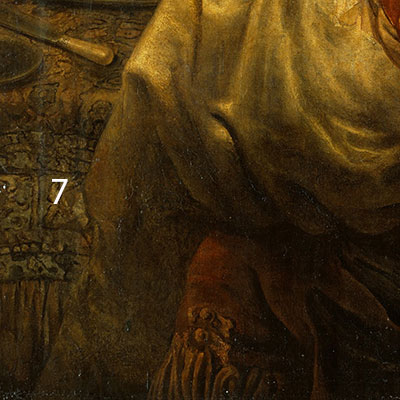
8 Brown-black in the right edge consists of two layers:
1. Yellow-brown ground: chalk and lead white with small amounts of yellow ochre and red ochre.
2. Brown-black layer: yellow ochre, red ochre, smalt, natural ultramarine, lead white, and Vandyke brown.
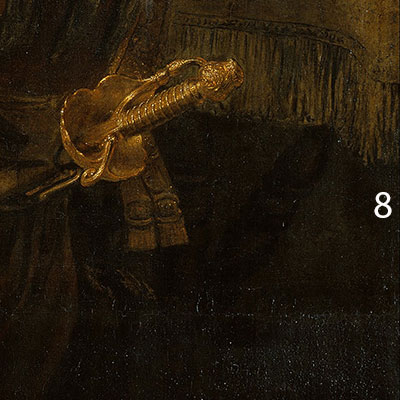
References
(1) Kühn, Hermann. ‘Untersuchungen zu den Pigmenten und Malgründen Rembrandts, durchgeführt an den Gemälden der Staatlichen Kunstsammlungen Dresden’, Maltechnik/Restauro, issue 4 (1977): 223-233.
Pigments Used in this Painting
Resources
See the collection of online and offline resources such as books, articles, videos, and websites on Rembrandt in the section ‘Resources on Painters‘
PowerPoint Presentations
Painter in Context: Rembrandt
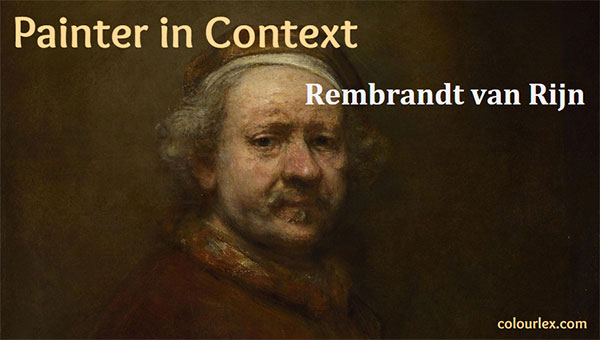
A richly illustrated presentation on the painting technique and pigments employed by Hieronymus Bosch specially crafted for Art Education. (Number of Slides = 20)
- Each presentation starts with the basic resources on the painter such as his biography, main catalogs of his paintings, and a bibliography.
- Next, you find slides describing the painting technique of the artist and the pigments he usually employed in his work.
- The majority of the slides show examples of paintings containing the specific pigments.
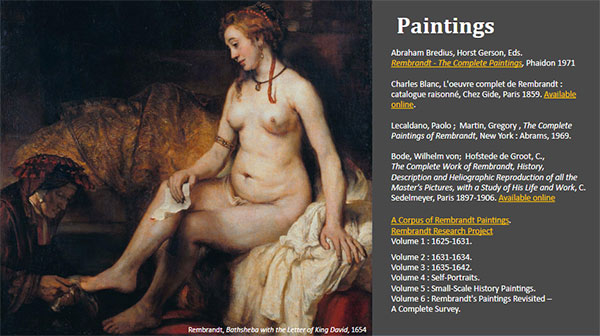
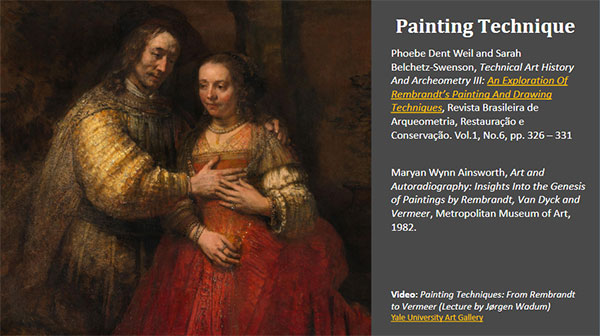
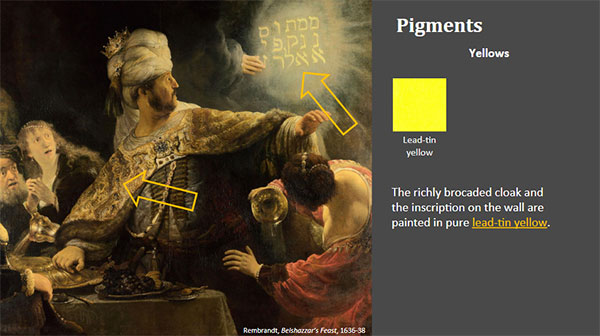
The majority of the slides show important examples of paintings where Rembrandt employed specific pigments. The slides are organized according to the color of the pigments.
Videos
Video: 'Rembrandt & Saskia Exhibition' by Fries Museum 2018 | Irene Veltman
Video: 'Rembrandt's Women' by Rembrandt Tour
Publications and Websites
Publications
(1) Kühn, Hermann. ‘Untersuchungen zu den Pigmenten und Malgründen Rembrandts, durchgeführt an den Gemälden der Staatlichen Kunstsammlungen Dresden’, Maltechnik/Restauro, issue 4 (1977): 223-33
(3) Bruyn, J. et al., The prodigal son in the tavern, in A Corpus of Rembrandt Paintings, Stichting Foundation Rembrandt Research Project, Volume 3, Springer 1989, pp 134-147.
(4) Ingvar Bergström, Rembrandt’s double portrait of himself and Saskia at the Dresden Gallery. A tradition transformed, Nederlands kunsthistorisch jaarboek = Netherlands yearbook for history of art, p. 143-169, 1968
(5) Annaliese Mayer-Meintschel, Rembrandt und Saskia im Gleichnis vom Verlorenen Sohn, Jahrbuch der Staatlichen Kunstsammlungen Dresden : Berichte, Beiträge, p. 39-57, 1970-1971
(6) Uta Neidhardt, Historie, Genrestück oder Doppelbildnis? Fortgesetzte Beobachtungen zu Rembrandts Dresdener “Selbstbildnis mit Saskia im Gleichnis vom verlorenen Sohn“, in: Dresdener Kunstblätter: Monatsschrift der Staatlichen Kunstsammlungen Dresden, p. 356-366, 2006
(7) Christoph Schölzel, Die Restaurierungen von Rembrandts Gemälde “Selbstbildnis mit Saskia im Gleichnis vom verlorenen Sohn”, in: Dresdener Kunstblätter : Monatsschrift der Staatlichen Kunstsammlungen Dresden, p. 343-356, 2006
(8) Julia Lloyd Williams, with a contribution by S.A.C. Dudok van Heel, Rembrandt’s women, Catalogue of an exhibition held in 2001 in Edinburgh (National Gallery of Scotland) and London (Royal Academy of Arts)
271 pp.
Websites
Rembrandt, Self-portrait as the prodigal son, Rembrandt Database.

